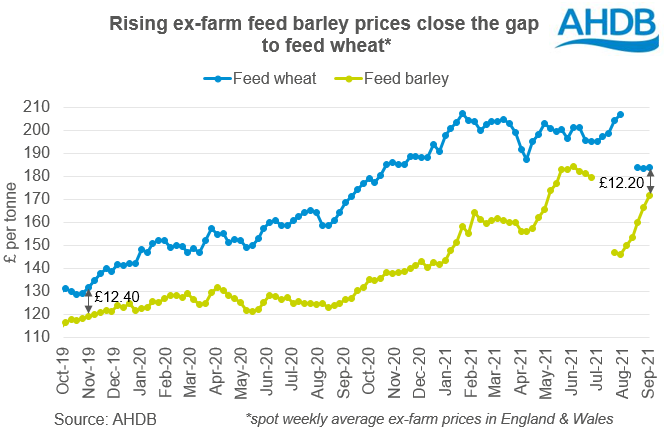Feed barley prices highest since end-June: Grain market daily
Tuesday, 7 September 2021
Market commentary
- Nov-21 UK feed wheat futures closed at £188.25/t yesterday. This is down £2.00/t from Friday’s close and the lowest price since 9 August.
- UK and Paris wheat futures drifted lower during the day with lower volumes traded while the US market shut for a national holiday. There was also hesitation about Friday night’s USDA report. Polls by Reuters point to the market expecting bigger US maize and soyabean crops.
- There was also pressure at the end of the trading day after the Australian government sharply upgraded its forecasts for the 2021/22 wheat (+4.8Mt to 32.6Mt) and barley (+2.1Mt to 12.5Mt) crops. It also lifted the rapeseed crop forecast to a new record of 5.03Mt, 0.8Mt above June’s forecast.

Feed barley prices highest since end-June
Last week (week ending Thursday) ex-farm feed barley was traded for £170.80/t on average across the UK (spot delivery). This is the highest price reported since the end of June and the highest price for the start of September since 2012.
Global barley prices rose steadily during August as weather reduced crop prospects in Canada, a top exporter. This support likely filtered through into UK prices.
In the UK, usage of feed barley in July remained high, amid a slow start to the 2021 harvest, challenging logistics and low liquidity. Animal feed compounders and Integrated Poultry Units used 130.7Kt of barley in July, a record for the month.
Meanwhile, the English barley area is 23% smaller than 2020 according to provisional figures from Defra. With yields reported so far (up to 24 August) just above the five-year averages, the crop will be smaller this year.
Due to the rise in feed barley prices, the gap between feed wheat and feed barley ex-farm prices has also narrowed considerably compared to last season. Last week, across England and Wales the gap averaged £12.20/t, the smallest weekly gap since October 2019. In 2020/21, the gap averaged £44.20/t and at times was over £50/t.
The gap is still larger than at this stage in the 2019/20 season, which is likely to support the use of barley in rations. In 2019/20, 4.14Mt of barley was used as animal feed in total.
Meanwhile, demand for feed wheat is expected to be high in 2021/22, in part due to higher bioethanol production following the introduction of E10 in the UK. This could support UK feed wheat prices, especially once harvest concludes.
However, if the gap between feed wheat and feed barley continues to narrow the incentive to use barley could reduce.
We will also need to watch the cost of importing grain into the UK, especially once maize harvests start in Europe.
Sign up for regular updates
You can subscribe to receive Grain Market Daily straight to your inbox. Simply fill in your contact details on our online form and select the information you wish to receive.
While AHDB seeks to ensure that the information contained on this webpage is accurate at the time of publication, no warranty is given in respect of the information and data provided. You are responsible for how you use the information. To the maximum extent permitted by law, AHDB accepts no liability for loss, damage or injury howsoever caused or suffered (including that caused by negligence) directly or indirectly in relation to the information or data provided in this publication.
All intellectual property rights in the information and data on this webpage belong to or are licensed by AHDB. You are authorised to use such information for your internal business purposes only and you must not provide this information to any other third parties, including further publication of the information, or for commercial gain in any way whatsoever without the prior written permission of AHDB for each third party disclosure, publication or commercial arrangement. For more information, please see our Terms of Use and Privacy Notice or contact the Director of Corporate Affairs at info@ahdb.org.uk © Agriculture and Horticulture Development Board. All rights reserved.


